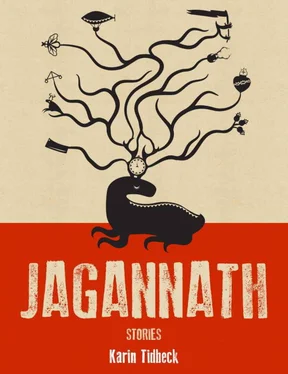Rak grew, putting on muscle and fat. She was one of twelve workers in the Belly. They worked and slept in shifts. One worked until tired, then ate, and then curled up in the sleeping niche next to whoever was there. Rak learned work songs to sing in time with the kneading of Mother’s intestines, the turning of the valves. The eldest worker, an enormous female called Poi, usually led the chorus. They sang stories of how Mother saved their people. They sang of the parts of Her glorious body, the movement of Her myriad legs.
“What is outside Mother?” Rak asked once, curled up next to Hap, wrapped in the scent of sweat and oil.
“The horrible place that Mother saved us from,” mumbled Hap. “Go to sleep.”
“Have you seen it?”
Hap scoffed. “No, and I don’t want to. Neither do you. Now quiet.”
Rak closed her eyes, thinking of what kind of world might be outside Mother’s body, but could only imagine darkness. The thought made a chill run down her back. She crept closer to Hap, nestling against her back.
The workload was never constant. It had to do with where Mother went and what she ate. Times of plenty meant hard work, the peristaltic engine swelling with food. But during those times, the females also ate well; the mucus coating Mother’s walls grew thick and fragrant, and Rak would put on a good layer of fat. Then Mother would move on and the food become less plentiful, Her innards thinning out and the mucus drying and caking. The workers would slow down, sleep more, and wait for a change. Regardless of how much there was to eat, Rak still grew, until she looked up and realized she was no longer so small compared to the others.
Poi died in her sleep. Rak woke up next to her cooling body, confused that Poi wasn’t breathing. Hap had to explain that she was dead. Rak had never seen a dead person before. Poi just lay there, her body marked from the lean time, folds of skin hanging from her frame.
The workers carried Poi to a sphincter near the top of the chamber, and dropped her into Mother’s intestine. They took turns kneading the body through Mother’s flesh, the bulge becoming smaller and smaller until Poi was consumed altogether.
“Go to the Nursery, Rak,” said Hap. “Get a new worker.”
Rak made her way up the tubes. It was her first time outside the Belly since leaving the Nursery. The corridors looked just like they had when Hap had led her through them long ago.
The Nursery looked much smaller. Rak towered in the opening, looking down at the tiny niches in the walls and the birthing tube bending down from the ceiling. Papa sat on his cot, crumpled and wrinkly. He stood up when Rak came in, barely reaching her shoulder.
“Rak, is it?” he said. He reached up and patted her arm. “You’re big and strong. Good, good.”
“I’ve come for a new worker, Papa,” said Rak.
“Of course you have.” Papa looked sideways, wringing his hands.
“Where are the babies?” she said.
“There are none,” Papa replied. He shook his head. “There haven’t been any… viable children, for a long time.”
“I don’t understand,” said Rak.
“I’m sorry, Rak.” Papa shrank back against the wall. “I have no worker to give you.”
“What’s happening, Papa? Why are there no babies?”
“I don’t know. Maybe it is because of the lean times. But there have been lean times before, and there were babies then. And no visits from the Head, either. The Head would know. But no one comes. I have been all alone.” Papa reached out for Rak, stroking her arm. “All alone.”
Rak looked down at his hand. It was dry and light. “Did you go to the Head and ask?”
Papa blinked. “I couldn’t do that. My place is in the Nursery. Only the pilots go to the Head.”
The birthing tube gurgled. Something landed on the bedding with a splat. Rak craned her neck to look.
“But look, there’s a baby,” she said.
The lumpy shape was raw and red. Stubby limbs stuck out here and there. The head was too big. There were no eyes or nose, just a misshapen mouth. As Rak and Papa stared in silence, it opened its mouth and wailed.
“I don’t know what to do,” whispered Papa. “All the time, they come out like this.”
He gently gathered up the malformed thing, covering its mouth with a hand until it stopped breathing. Tears rolled down his lined cheeks.
“My poor babies,” said Papa.
As Rak left, Papa rocked the lump in his arms, weeping.
Rak didn’t return to the Belly. She went forward. The corridor quickly narrowed, forcing Rak to a slow crawl on all fours. The rumble and sway of Mother’s movement, so different from the gentle roll of the Belly, pressed her against the walls. Eventually, the tunnel widened into a round chamber. At the opposite end sat a puckered opening. On her right, a large round metallic plate was set into the flesh of the wall, the bulges ringing it glowing brightly red. Rak crossed the chamber to the opening on the other side. She touched it, and it moved with a groaning noise.
It was a tiny space: a hammock wrapped in cabling and tubes in front of two circular panes. Rak sat down in the hammock. The seat flexed around her, moulding itself to her shape. The panes were streaked with mucus and oil, but she could faintly see light and movement on the other side. It made her eyes hurt. A tube snaked down from above, nudging her cheek. Rak automatically turned her head and opened her mouth. The tube thrust into her right nostril. Pain shot up between Rak’s eyes. Her vision went dark. When it cleared, she let out a scream.
Above, a blinding point of light shone in an expanse of vibrant blue. Below, a blur of browns and yellows rolled past with alarming speed.
Who are you? a voice said. It was soft and heavy. I was so lonely.
“Hurts,” Rak managed.
The colours and light muted, and the vision narrowed at the edges so that it seemed Rak was running through a tunnel. She unclenched her hands, breathing heavily.
Better?
Rak grunted.
You are seeing through my eyes. This is the outside world. But you are safe inside me, my child.
“Mother,” said Rak.
Yes. I am your mother. Which of my children are you?
The voice was soothing, making it easier to breathe. “I’m Rak. From the Belly.”
Rak, my child. I am so glad to meet you.
The scene outside rolled by: yellows and reds, and the blue mass above. Mother named the things for her. Sky. Ground. Sun. She named the sharp things scything out at the bottom of her vision: mandibles¸ and the frenetically moving shapes glimpsed at the edges: legs. The cold fear of the enormous outside gradually faded in the presence of that warm voice. An urge to urinate made Rak aware of her own body again, and her purpose there.
“Mother. Something is wrong,” she said. “The babies are born wrong. We need your help.”
Nutrient and DNA deficiency, Mother hummed. I need food.
“But you can move everywhere, Mother. Why are you not finding food?”
Guidance systems malfunction. Food sources in the current area are depleted.
“ Can I help, Mother?”
The way ahead bent slightly to the right. Mother was running in a circle.
There is an obstruction in my mainframe. Please remove the obstruction.
Behind Rak, something clanged. The tube slithered out of her nostril and she could see the room around her again. She turned her head. Behind the hammock a hatch had opened in the ceiling, the lid hanging down, rungs lining the inside. The hammock let Rak go with a sucking noise and she climbed up the rungs.
Inside, gently lit in red, was Mother’s brain: a small space surrounded by cables winding into flesh. A slow pulse beat through the walls. Half sitting against the wall was the emaciated body of a male. Its head and right shoulder were resting on a tangle of delicate tubes, bloated and stiff where they ran in under the dead male’s body, thin and atrophied on the other. Rak pulled at an arm. Mother had started to absorb the corpse; it was partly fused to the wall. She tugged harder, and the upper body finally tore away and fell sideways. There was a rushing sound as pressure in the tubes evened out. The body was no longer in the way of any wires or tubes that Rak could see. She left it on the floor and climbed back down the hatch. Back in the hammock, the tube snuck into her nostril, and Mother’s voice was in her head again.
Читать дальше












![Карин Тидбек - Аматка [ЛП]](/books/438406/karin-tidbek-amatka-lp-thumb.webp)